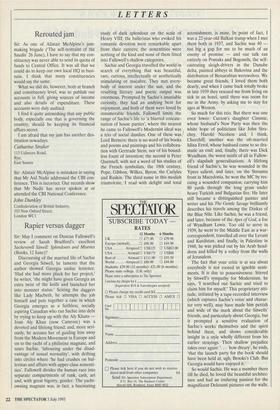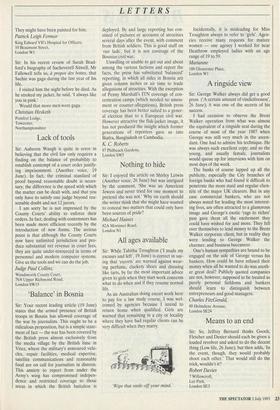Rapier versus dagger
Sir: May I comment on Duncan Fallowell's review of Sarah Bradford's excellent Sacheverell Sitwell: Splendours and Miseries (Books, 12 June)?
Discoursing of the married life of Sachie and Georgia Sitwell, he laments that the author showed Georgia undue lenience. 'Had she had more pluck for her project,' he writes, 'she might have given Georgia an extra twist of the knife and launched her into monster status.' Seizing the daggers like Lady Macbeth, he attempts the job himself and puts together a case in which Georgia emerges as a faithless, socially aspiring Canadian who ran Sachie into debt by trying to keep up with the Aly Khans — Joan Aly Khan (now Camrose) was a devoted and lifelong friend; and, more seri- ously, he accuses her of guiding him away from the Modern Movement in Europe and on to the yacht of a philistine magnate, and taxes Sachie, 'labouring under the disad- vantage of sexual normality', with drifting into circles where 'he had crushes on bal- lerinas and affairs with upper-class nonenti- ties'. Fallowell divides the human race into separate compartments of rank, cash, art and, with great bigotry, gender. The yacht- owning magnate was, in fact, a fascinating study of dark splendour on the scale of Henry VIII; the ballerinas who evoked his romantic devotion were remarkable apart from their careers; the nonentities were nothing of the kind and none of them fitted into Fallowell's shallow categories.
Sachie and Georgia travelled the world in search of everything that was beautiful, rare, curious, intellectually or aesthetically stimulating or macabre. They met every- body of interest under the sun, and the resulting literary and poetic output was enormous. Prompted by Sachie's insatiable curiosity, they had an undying bent for enjoyment, and both of them were loved by innumerable friends. Fallowell limits the range of Sachie's life to 'a blurred concate- nation of house parties', where the nearest he came to Fallowell's Modernist ideal was , a trio of social dandies. One of these was / Lord Berners: there is no word of his books and poems and paintings and his collabora- tion with Gertrude Stein, nor of his bound- less fount of invention; the second is Peter Quennell, with not a word of his studies of the French symbolists, the 18th century, Pope, Gibbon, Wilkes, Byron, the Carlyles and Ruskin. The third name in this modish triumvirate, I read with delight and total astonishment, is mine. In point of fact, 1 was a 22-year-old Balkan tramp when I met them both in 1937, and Sachie was 40 — too big a gap for me to be much of an enemy of promise — and our talk ran entirely on Pomaks and Bogomils, the self- castrating sleigh-drivers in the Danube delta, painted abbeys in Bukovina and the distribution of Bessarabian werewolves. We became great friends, I loved them both dearly, and when I came back totally broke in late 1939 they rescued me from living on tick in an hotel, until there was room for me in the Army, by asking me to stay for ages at Weston.
So much for this trio. But there was one even lower: Curzon's daughter Cimmie, whose husband's New Party was then the white hope of politicians like John Stra- chey, Harold Nicolson and, I think, Churchill; another was the oft-married Idina Errol, whose husband came to so dra- matic an end; and, finally, there was Dick Wyndham, the worst misfit of all in Fallow- ell's slapdash generalisations. A lifelong friend of Sachie's, he was wounded in the Ypres salient, and later, on the Strouma front in Macedonia, he won the MC by res- cuing a wounded companion, carrying him 80 yards through the long grass under heavy Turkish and Bulgarian fire. He later still became a distinguished painter and writer and his The Gentle Savage brilliantly describes his travels among the Dinkas of the Blue Nile. Like Sachie, he was a friend, and later, because of the Apes of God, a foe of Wyndham Lewis. Too old to serve in 1939, he went to the Middle East as a war- correspondent, travelled all over the Levant and Kurdistan, and finally, in Palestine in 1948, he was picked out by his Arab head- dress and killed by a volley from the walls of Jerusalem.
The fact that your critic is at sea about everybody is not rooted in ignoble senti- ments. It is due to possessiveness. Stirred by Sitwell's sympathy for Modernism, he says, 'I searched out Sachie and tried to claim him for myself.' This proprietary atti- tude, initiated by a tape-recorded interview (which captures Sachie's voice and charac- ter very well), may have made him pettish and wide of the mark about the Sitwells' friends, and particularly about Georgia, but it prompted a sensitive evaluation of Sachie's works themselves and the spirit behind them, and shows considerable insight in a style wholly different from his earlier strayings. Then shallow prejudice takes over again: `. . . how dreary', he ends, 'that the launch party for the book should have been held at, ugh, Brooks's Club. But Georgia would have enjoyed it.'
So would Sachie. He was a member there till he died, he loved the beautiful architec- ture and had an enduring passion for the magnificent Deletanti pictures on the walls.
LETTERS
They might have been painted for him.
Patrick Leigh Fermor
King Edward VII's Hospital for Officers, 10 Beaumont Street, London WI



















































 Previous page
Previous page